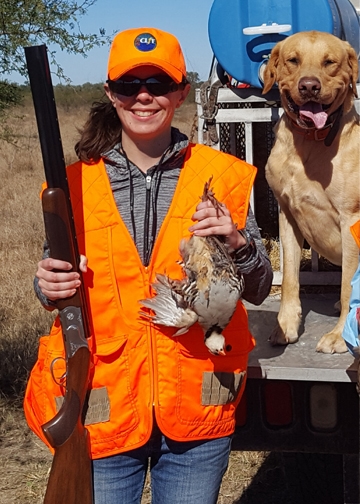
Rachel Bittner
Sul Ross State University
Graduate Research Assistant/Master’s of Science/Department of Natural Resources Management
Assessing Eyeworm and Cecal Worm Infestations in Quail Throughout the Trans-Pecos Region of Texas
My name is Rachel Bittner and I am from the small town of Lockhart, Texas. My introduction to the wildlife field began as a child camping, hiking, and fishing at state parks around Texas with my family. I grew to respect and admire the natural world and decided upon applying to college that I wanted to major in wildlife biology so that I could develop my skills to not only help protect and conserve the wild places but the wildlife of Texas. I received my B.S. in Natural Resources Management with a concentration in Wildlife Biology from Texas Tech University May of 2018 and started my Master’s August of 2018.
There is concern for the effects of parasites and diseases on wildlife but also their possible transmission and impact to human and livestock health. While many upland game bird studies have focused on habitat, nest/chick survival, etc., due to the decline of several upland game bird species, such as quail, research on parasites and diseases affecting these species is also rising. Upland game birds, such as quail, are an important economic resource in Texas and around the United States due to hunting and associated expenses generating revenue into the economy annually.
The effects of parasites on quail survival, reproduction, and overall health has not been well studied throughout their ranges, much less in the Trans-Pecos. The most common parasites known to affect quail in the Trans-Pecos are helminths. The helminths of concern to quail are eyeworm (Oxyspirura petrowi) and the cecal worm (Aulonocephalus pennula). The parasite loads in Trans-Pecos quail species, scaled quail (Callipepla squamata), Gambel’s quail (Callipepla gambelii), and Montezuma quail (Cyrtonyx montezumae), has not been as intensely researched as in other areas of these quail’s ranges. My Master’s research focuses on determining the overall prevalence of eyeworm and cecal worm concentrations throughout the Trans-Pecos, evaluate the effects of the precipitation gradient on eyeworm and cecal worm prevalence ,and assess the impacts of supplemental feeding on host concentration and parasite loads in scaled quail for scaled, Gambel’s, and Montezuma quail.

